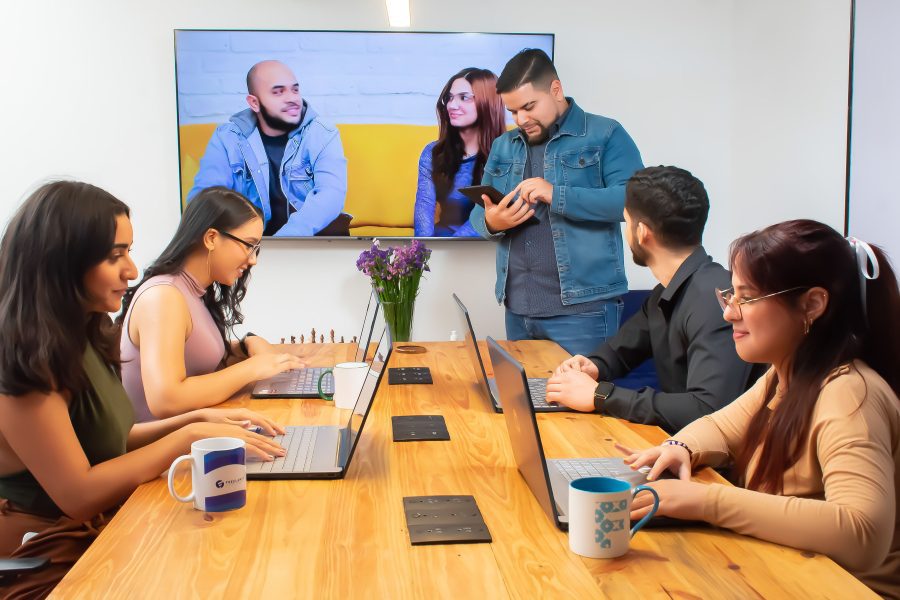Assertiveness is the ability to express your thoughts, feelings, and needs clearly and respectfully without being passive or aggressive. It’s about finding the right balance between standing up for yourself and respecting others. For freelancers, this skill is not just important—it’s essential. Assertiveness helps you manage multiple clients, set clear expectations, and protect your time and well-being.
Being assertive means confidently negotiating rates, setting deadlines, and managing your workload without fearing overcommitting or underperforming. It enables you to communicate your value and ensure that you and your clients are on the same page.
In this article, we’ll explore why assertiveness is a game-changer for freelancers in Latin America and how you can start practicing it to build stronger client relationships and maintain a healthier work-life balance.

Understanding the Importance of Assertiveness for Remote Workers
As a freelancer or remote worker, assertiveness plays a crucial role in shaping your professional journey. It’s not just about speaking up for yourself—it’s about building a sustainable, balanced, and respected career. Here’s why assertiveness is so important for remote workers, especially those in freelancing:
Building Professional Relationships
In the world of freelancing, your ability to build and maintain strong, professional relationships is paramount. Clear, respectful communication is the foundation of trust between you and your clients. Assertiveness allows you to express your expectations, preferences, and needs in a way that fosters understanding rather than confusion.
When you’re clear about your availability, working style, or preferred methods of communication, it helps clients know exactly what to expect, reducing the risk of misunderstandings or friction down the line.
Assertiveness also encourages clients to be more open about their needs and challenges, leading to better collaboration and stronger partnerships. For freelancers, establishing these boundaries and expectations from the outset helps create a professional atmosphere where mutual respect thrives.
Setting Boundaries
One of the most significant challenges freelancers face is the blurred line between work and personal life. Without an office to go to or a supervisor to report to, it’s easy for work to seep into every corner of your day. Assertiveness is key to maintaining healthy boundaries, essential for mental well-being and professional productivity.
Being assertive allows you to set precise working hours, define the scope of your projects, and say no to unreasonable requests without feeling guilty. It means being able to tell clients when you’re unavailable, ensuring they respect your time.
For instance, if a client insists on last-minute changes or asks for additional work outside the agreed-upon scope, assertiveness helps you stand firm and communicate your limits without compromising your professionalism. Setting these boundaries prevents burnout, maintains a balanced work-life dynamic, and ensures you remain in control of your freelance business.
Improving Negotiations
Negotiating rates, timelines, and project terms is part of the job as a freelancer. However, many freelancers struggle to assert themselves in these situations, often undervaluing their work or accepting unfavorable terms due to fear of rejection. Assertiveness is a vital tool in overcoming these challenges.
When you’re assertive, you have the confidence to communicate the value of your work and negotiate terms that are fair and reflective of your skills. Whether setting your hourly rate, proposing a timeline that fits your workflow, or negotiating payment terms, assertiveness ensures that you advocate for yourself while maintaining professionalism.

This is particularly important when dealing with clients who may push for lower rates or unreasonable deadlines. By asserting your needs and negotiating confidently, you help set expectations early on and ensure that the project moves forward smoothly, with both parties aligned on goals and deliverables.
In essence, assertiveness empowers you to take charge of your freelance career—building trust, maintaining healthy boundaries, and securing the compensation and conditions that reflect the value you bring to the table.
Common Misconceptions About Assertiveness
While assertiveness is an essential skill for freelancers, there are often misconceptions about what it truly means to be assertive. These misunderstandings can lead to hesitation or confusion about communicating effectively, especially in a professional setting. Let’s explore two common misconceptions and how they relate to freelancing in Latin America:
Being Assertive vs. Being Aggressive
One of the most significant misconceptions about assertiveness is that it’s the same as being aggressive. Many freelancers shy away from assertive communication because they fear it might come off as rude or confrontational. However, assertiveness is about expressing your thoughts, needs, and boundaries clearly and respectfully—not forcing your will onto others.
- Assertiveness involves standing up for yourself while respecting others’ opinions and feelings. It’s about stating your needs directly without sugarcoating, hesitating, or disrespecting the other party. For example, instead of agreeing to an unrealistic deadline to avoid conflict, you could say, “I understand the urgency, but I would need an additional two days to ensure the quality of the work.”
- Aggression, on the other hand, often involves a forceful or hostile tone that disregards the other person’s needs or feelings. It can come across as disrespectful or dismissive. For instance, responding with “I don’t care about your deadline. I’m not doing it until I say so!” crosses the line into aggression, which can harm relationships and hurt your reputation.
For freelancers, mastering the balance between assertiveness and aggression is crucial. Assertiveness means confidently standing up for your needs and rights without belittling or intimidating the other party.
It’s important to communicate calmly and with clarity while always maintaining professionalism. This way, clients will understand that you value your time and work without feeling like you’re being confrontational.
Cultural Considerations in Latin America
Cultural differences significantly affect how assertiveness is perceived, particularly in Latin American countries. In some cultures, being direct and outspoken can be seen as impolite or disrespectful, especially when interacting with authority figures or clients. As a freelancer, it’s important to be aware of these cultural nuances and adjust your approach accordingly.
In many Latin American cultures, there is a strong emphasis on respect and hierarchy, which can sometimes make assertiveness feel more challenging. For instance, in countries where formality and politeness are highly valued, being too direct or blunt might be interpreted as rudeness. This doesn’t mean freelancers should avoid assertiveness altogether; it requires a more thoughtful approach.
- Indirect Communication: In some Latin American countries, indirect communication is common. Instead of saying, “I can’t do this,” freelancers might phrase it more softly, such as “This may be a challenge given my current workload.” While this is still assertive, it shows respect for the client’s position while communicating your needs.
- Tone and Language: In Latin America, tone and word choice can be crucial. Using polite forms of address, such as “usted” instead of “tú,” can help soften assertive statements and maintain a respectful tone. Likewise, beginning conversations with expressions like “I hope all is well” or “Thank you for your understanding” can help create a more cordial atmosphere, even when you need to set boundaries or communicate difficult messages.
- Context Matters: In more hierarchical or family-oriented business cultures, freelancers may need to approach assertiveness with greater sensitivity to the power dynamics at play. When communicating with clients, especially those in leadership positions, showing respect for their authority while being firm about your needs is key.
Understanding these cultural differences and adjusting your assertive style will help you navigate client relationships more effectively. By adapting your assertive and culturally aware communication, you can build stronger, more respectful partnerships with clients and create an environment where both parties feel valued and understood.
In conclusion, assertiveness isn’t about being aggressive or disrespectful—it’s about communicating your needs clearly and confidently while respecting the needs of others. For freelancers in Latin America, understanding the balance between assertiveness and cultural sensitivity is crucial for maintaining professionalism, building strong relationships, and achieving long-term success.

Practical Tips for Practicing Assertiveness
Now that we’ve explored the importance of assertiveness and common misconceptions, it’s time to put these ideas into practice. For freelancers, becoming more assertive can be a game-changer in managing client relationships, setting boundaries, and ensuring long-term success. Here are four practical tips to help you communicate assertively, maintain control over your freelance career, and protect your time and well-being.
Start with Clear Communication
One of the simplest yet most effective ways to practice assertiveness is to communicate clearly from the start, whether discussing deadlines, payment terms, or the scope of a project; being upfront about what you need sets the foundation for mutual understanding and reduces the risk of misunderstandings.
Clarity is key in avoiding confusion, setting expectations, and ensuring everyone is on the same page. By expressing your needs in clear, unambiguous terms, you help prevent unnecessary back-and-forth and ensure smoother collaboration with your clients.
Example: “Make sure your contract clearly outlines project milestones, payment dates, and other important expectations. For example, you might write: ‘The first draft will be submitted by [date], with payment due upon receipt. The final deliverable will be submitted by [date].’ This avoids confusion and keeps everything professional.”
Being specific about what you need also shows that you take your work seriously and expect the same level of professionalism from your clients.
Use “I” Statements
When expressing your needs or concerns, using “I” statements is a powerful technique that helps you communicate assertively without sounding accusatory or defensive. “I” statements are direct and personal, allowing you to express your feelings or expectations without blaming the other person or putting them on the defensive.
For instance, instead of saying, “You never clarify the project scope,” you can say, “I would appreciate it if we could discuss the project scope before moving forward.” The second statement focuses on your need for clarity while maintaining a respectful tone. This approach helps keep conversations constructive and focused on finding solutions rather than escalating conflict.
Tip: Avoid phrases that begin with “You” unless framed positively and constructively. “You always…”, “You never…” or “You didn’t…” can feel accusatory and lead to defensiveness. Instead, frame it from your perspective with “I feel…” or “I need…”
Using “I” statements helps you assert yourself while taking responsibility for your thoughts and feelings and encourages others to engage with you more openly.
Practice Saying No
One of the most complex skills for freelancers to develop is the ability to say “no.” However, being able to politely and confidently decline unreasonable requests or tasks that don’t align with your current workload is essential for maintaining a healthy work-life balance and protecting your mental health.
Saying “no” doesn’t mean you’re being difficult or unprofessional—it means you’re managing your time and energy wisely, which ultimately benefits both you and your clients. When you’re clear about your availability or limitations, clients will respect your boundaries, and you’ll avoid taking on too much work or becoming overwhelmed.
Example: “I’m unable to take on additional work right now due to current commitments, but I’d love to discuss future projects.” This response is firm and respectful, leaving the door open for future collaboration without overcommitting yourself.
Remember, you don’t have to explain yourself in detail. Simply stating that you’re not available is enough. You can also offer alternative solutions, such as recommending a colleague or proposing a later timeline, but always ensure that the decision aligns with your workload and goals.
Stay Calm and Professional
It’s easy to get emotional in challenging situations—especially when dealing with pushy clients, unreasonable demands, or unexpected changes. However, staying calm and professional is key to maintaining effective communication and ensuring you’re taken seriously.
When you’re emotionally charged, it’s easy to slip into a defensive or aggressive tone, which can undermine your message. Instead, take a deep breath, pause before responding, and maintain composure. Focus on the issue, and keep your communication clear and measured.
Tip: If you feel overwhelmed or frustrated during a conversation, asking for time to think things over is perfectly okay. You can say something like, “I need a moment to review this and will get back to you by [date/time].” This shows that you are handling the situation thoughtfully and ensures that you don’t respond in the heat of the moment.
Staying calm, even when clients are difficult or the pressure is on, not only helps you maintain control of the situation but also reinforces your professionalism. Clients are more likely to respect you when you remain composed, even under stress.
Everyone Can And Should Master Assertiveness
It’s not something that comes naturally to everyone, but it’s a skill that can be learned and honed over time with practice and patience. By being assertive, you not only protect your time, energy, and well-being but also build stronger, more respectful relationships with clients.
Assertiveness enables you to set clear expectations, negotiate confidently, and maintain healthy boundaries, ultimately leading to greater satisfaction and success in your freelance career.
Remember, the more you practice assertiveness, the easier it becomes to communicate your needs and stand firm in your decisions without fear or hesitation. As you strengthen this skill, you’ll enjoy more fulfilling client relationships and greater control over your work-life balance.
Freelancing can be a rewarding journey, but taking charge of your career with confidence and clarity is essential. Assertiveness is key to protecting your time and ensuring that your freelance business thrives. Keep practicing these techniques; over time, you’ll see how assertiveness transforms your professional life, making you more confident, respected, and successful.
See more articles by Andrea Corona.





